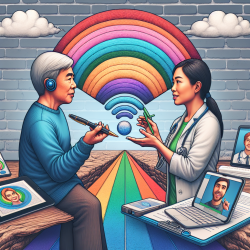In recent years, the advent of online therapy services, such as those provided by TinyEYE, has revolutionized the way we support our students and staff. These services not only offer a flexible and accessible means of delivering therapy but also help to alleviate some of the pressures faced by special education professionals.
Here are several ways we can build a supportive community for special education advocates:
- Fostering Open Communication: Encouraging open dialogue among team members can help to identify stressors early and provide opportunities for collective problem-solving. Regular meetings and check-ins create a platform for sharing concerns and celebrating successes.
- Providing Access to Resources: Ensuring that advocates have access to the latest research, training, and tools is essential. This includes access to webinars, conferences, and publications that offer insights into best practices and innovative approaches.
- Promoting Mental Health Awareness: Addressing mental health is critical. Offering mental health resources and support can help advocates manage stress and prevent burnout. Online therapy services can be a valuable resource in this regard.
- Encouraging Professional Development: Supporting ongoing professional development through telepractice jobs and other opportunities helps advocates stay motivated and engaged. This also allows them to expand their skill sets and better serve their students.
- Creating a Collaborative Environment: Building a culture of collaboration and mutual support can enhance job satisfaction and reduce feelings of isolation. Team-building activities and peer support networks can contribute to a more cohesive and resilient community.
At TinyEYE, we are committed to supporting special education advocates by providing high-quality online therapy services. Our platform offers a range of tools and resources designed to make therapy more accessible and effective. By leveraging technology, we can help to reduce the burden on special education professionals and improve outcomes for students.
In conclusion, building a supportive community for special education advocates is essential for preventing burnout and ensuring that students receive the best possible care. By fostering open communication, providing access to resources, promoting mental health awareness, encouraging professional development, and creating a collaborative environment, we can create a more sustainable and fulfilling work environment for advocates.
Let us work together to support those who dedicate their lives to advocating for students with disabilities. By investing in our advocates, we invest in the future of our students.










